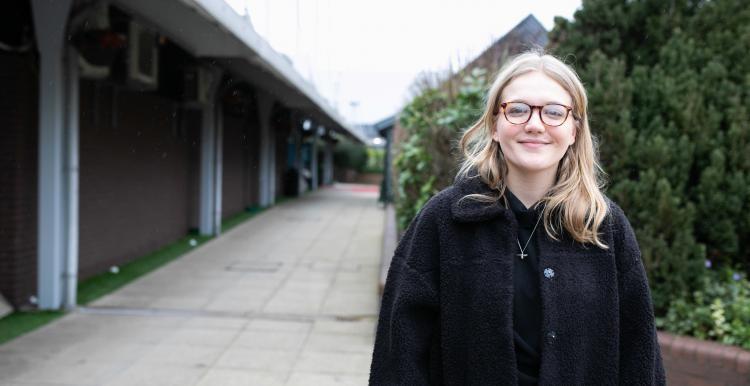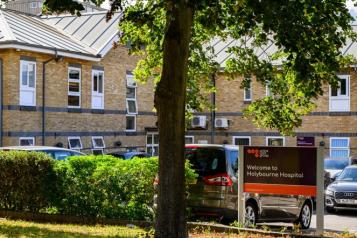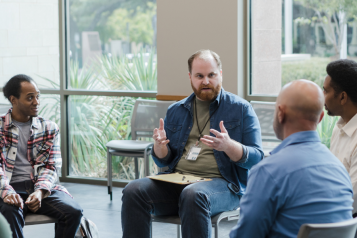Coronavirus is affecting my mental health – what can I do?

1. Seek accurate information from legitimate sources
Try to only read information about Coronavirus from official sources:
Only reading credible sources of information can help you avoid the fear and panic that misinformation may cause, which can fuel anxiety. Having access to good quality information about the virus can help you feel more in control.
2. Try to avoid excessive exposure to media coverage
Constantly monitoring the news and your social media feeds about COVID-19 can intensify feelings of worry and distress. It’s important to find a balance while keeping informed. If you find the news is making you feel stressed, set boundaries for how much news you read, watch or listen to. For example, turn off phone notifications from news apps.
3. Look after yourself
It's normal to feel vulnerable and overwhelmed as we read news about the outbreak. Focus on the things you can control, instead of those you can't. Where possible, maintain your daily routine, and prioritise your wellbeing and mental health.
4. Stay connected and reach out to others
Keeping in touch with your friends and family and talking through your concerns can help ease the stress caused by COVID-19. Check in with people who you know may be worried or live alone. If you are very worried, contact a helpline for emotional support.
5. Talk to your children
It's equally important to help children cope with stress too. Answer their questions and share facts about COVID-19 in a way that children can understand, without causing them alarm.
The World Health Organisation have created advice on how to help children cope with stress during Coronavirus.
6. Don’t make assumptions
It's important not to judge people and avoid jumping to conclusions about who is responsible for the spread of the disease. The virus can affect anyone, regardless of gender, ethnicity, or sex.
7. Stay well while self-isolating
If you are showing symptoms or have the virus, you will be required to self-isolate and stay away from other people. This may seem like a daunting prospect, but keep in mind that this is only temporary.
It is important to create a daily routine that prioritises looking after yourself, such as catching up on sleep.
There are still many ways to stay connected to the people who matter to you, digitally, or on the phone. When staying in touch with friends on social media, try not to share content that sensationalises things. Your friends may be worried too. Only share content from trusted sources.
Remember to also look after your wider health needs, such as having enough prescription medicines available to you.
If you need ideas about how to support your wellbeing, Mind, the mental health charity, have put together practical tips to help you.
The information in this article was originally sourced from the Mental Health Foundation.
Two key mental health resources in Wandsworth that you could turn to for help are:
Talk Wandsworth
Talk Wandsworth provides free confidential support for common mental health problems, such as: depression, anxiety and stress.
They provide talking therapies for any one over the age of 18 who lives in, or who has a GP in, the London Borough of Wandsworth. The majority of our treatments are delivered in the form of Cognitive Behavioural Therapy (CBT).
Talk Wandsworth have adjusted their way of delivering treatments to ensure that they remain accessible. They are currently offering a number of different treatments that can be delivered remotely, including: telephone sessions, Skype sessions, Skype Groups and through evidence-based online platforms. Skype groups at this level, which run for between 5 and 7 weeks. Groups included are: Overcoming Worry (for anxiety), Mood Management (depression), Panic and Phobias, Managing Long Term Conditions and Stress Management.
You can access these services by self-referring:
Talk Wandsworth has opened a Covid-19 Support Line for residents of Wandsworth (or for those who are registered with a Wandsworth GP) and who are struggling with social isolation and the lockdown.
Call: 020 3513 6264 (Option 4)
We would like to encourage clients to engage with us via the social media platforms:
Twitter: (@talkwandsworth)
Instagram: (@talk.wandsworth.wellbeing)
Nextdoor: (NHS Talk Wandsworth).
To find out more and a full list of topics visit Talk Wandsworth website:
Togetherall (previously Big White Wall)
It’s not business as usual at the moment & it’s okay not to be okay. Connect with others who may be feeling the same at www.togetherall.com. A FREE online community dedicated to starting conversations & creating a safe place to share.
- Mental Health Support Online, anonymous and 24/7
- Community - Peer to peer support in a safe community - anonymous & monitored 24/7 by clinicians and therapists.
- Courses - Work through a selection of courses, with professional support on hand.
- Resources - Complete tests, access tools & content and receive helpful techniques to help manage mental health.
Children and Young People Mental Health
CAMHS services are still receiving referrals and treating young people during Covid-19 Crisis (some treatment will be via telephone and the internet during this difficult time). Routine referrals continue to be via our Single Point of Access (SPA): 0203 513 6631 and ssg-tr.wandsworthCAMHSreferral@nhs.net
We have now extended our online counseling provision via KOOTHS which is available to all Wandsworth young people. They can self-refer to this confidential service.
Please visit www.kooth.com We have now also set up a Mental Health Support Line for all young people in Crisis: 0800 028 8000, which you can phone during evenings and weekends. Please do not go to A&E if you are in crisis, instead we have set up the Orchid Crisis Unit at Springfield Hospital, which you may be advised to attend once you have phoned the Crisis Line, above.
Download the CAHMS - mental health map which lists mental health services in Wandsworth:
Wandsworth Mental Health Services
Emotional wellbeing: COVID-19 resource hub
Our children and young people’s emotional wellbeing continues to be a priority for South West London Health and Care Partnership. For a lot of people, the COVID-19 pandemic is a time of great uncertainty and many children and young people are feeling worried. To help, we have created an emotional wellbeing: COVID-19 resource hub
This resource offers information and advice for children and young people, parents and carers, teachers in South West London and collates links to preferred organisations. It provides information as well as interactive resources such as webinars, and signposts to places to access services. It has been created in collaboration with senior clinicians from South London and Maudsley NHS Trust, Off the Record, Croydon Drop In, South West London and St George’s Mental Health Trust and Achieving for Children. Information is easy to explore by theme:
- Staying well during the pandemic
- Explaining coronavirus
- Returning to school or college
- Stress, worry and anxiety
- Bereavement and loss
Good Thinking
Good Thinking provides digital mental wellbeing support for London. This includes free NHS-approved apps to help you deal with stress, anxiety, low mood and poor sleep. We are regularly adding new resources in relation to coronavirus so keep checking back to see what’s new. Whilst we endeavour to keep our content as up-to-date as possible, COVID-19 is a fast-moving situation. For the latest guidance, please visit the UK Government website.
Black Minds Matter
Their mission is to support in making mental health topics relevant and accessible for all black people in the U.K.
They have put together this organisation, to enable as many black people, to get specialised help. They aim to fulfill this by connecting black individuals and families with professional mental health services across the U.K
They have created a fund that will go towards covering the cost of any services that you might feel you could benefit from.
Finding a therapist and starting your journey towards improved mental health is as easy as browsing the website, choosing a therapist based on your needs, arranging a session and they will cover the cost.
Mental Health for Carers
If you look after someone who needs support because they have an illness or disability and cannot manage without help, you could be considered a carer.
Many people are a carer at some point in their lives even though they may have other responsibilities or need support themselves.
More information in the pamphlets on our carers page:
In an emergency
There is a new service at South West London and St George's Mental Health Trust for those who need emergency mental health support and don't have serious physical health needs.
They can call the Trust's mental health support line on 0800 028 8000 and if needed they may be directed to the dedicated Mental Health Emergency Department at Springfield hospital in Tooting. It is important that people call first.
Where can you get further mental health support?
Samaritans
If you need to speak to someone you can call the Samaritans. They're always open and are there to listen.
Call 116 123 to speak to someone.
Cruse
Cruse Bereavement Care provide bereavement support to people across the UK. Talk of death in the news and online can be distressing if you're already struggling with grief. If you need someone to talk to you can call the Cruse helpline. You can also talk to them if you've been bereaved as a result of Coronavirus.
0808 808 1677 - Monday-Friday 9.30- 5pm (excluding bank holidays), with extended hours on Tuesday, Wednesday and Thursday evenings, when they're open until 8pm.
Mind
Mind is a mental health charity which provides advice and support to empower anyone experiencing a mental health problem.
Mental Health Foundation
The UK's charity for everyone's mental health, promoting good mental health for all.
Visit the Mental Health Foundation website
Young Minds
Young Minds is a mental health charity for children and young people.
Mental Health Europe
Mental Health Europe is the largest independent network organisation representing mental health users, professionals and service providers across Europe.
Visit the Mental Health Europe website
Every mind matters
Advice and practical tips to help you look after your mental health and wellbeing.
Wandsworth Council
Information on health and wellbeing during coronavirus from Wandsworth Council's website.


